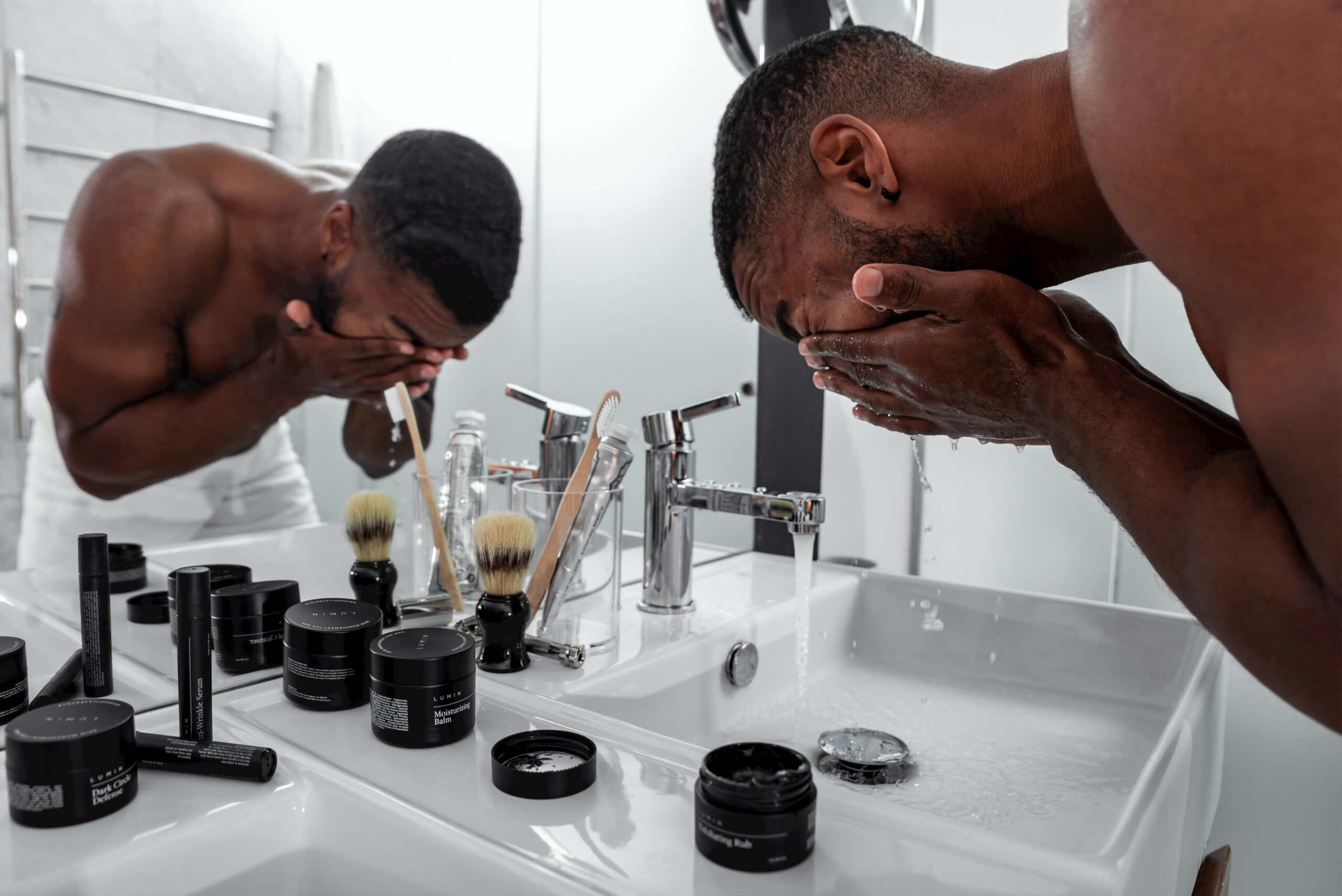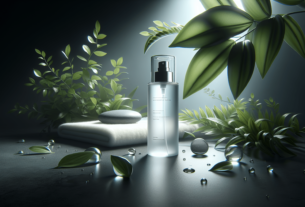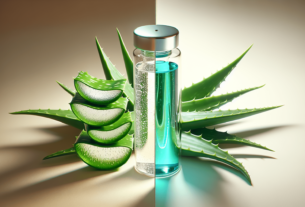Have you ever wondered how to maintain healthy skin amidst your busy lifestyle? For many men, skincare can seem like a complicated territory, overshadowed by misinformation and a plethora of products. However, taking care of your skin is essential, not just for appearance but for overall health. With some straightforward and practical tips, you can develop a skincare routine that fits seamlessly into your daily life.
Understanding Your Skin
Understanding your skin type is the cornerstone of any effective skincare routine. Men’s skin tends to differ from women’s in that it’s usually thicker and oilier, and it often faces stress from shaving. To cater properly to your skin’s needs, identifying whether you have oily, dry, combination, or sensitive skin is crucial.
Types of Skin
Let’s break down the common skin types:
| Skin Type | Description | Indicators |
|---|---|---|
| Oily | Produces excess oil; may have enlarged pores. | Shiny appearance and frequent breakouts. |
| Dry | Lack of natural oils; can appear flaky and rough. | Tight and itchy sensation, especially after washing. |
| Combination | Features characteristics of both oily and dry skin; typically oily in the T-zone (forehead, nose, and chin). | Shiny T-zone with dry cheeks. |
| Sensitive | Prone to irritation and redness; may react to certain products or environmental factors. | Redness, itching, burning, or dryness following product use. |
Identifying your skin type will help you choose the right products and tailor a skincare routine that works.
Developing a Skincare Routine
Consistency is key to effective skincare. A regular routine doesn’t have to be complex; even a simple regimen can provide substantial benefits. Here are some essential steps to get you started.
Cleansing
Cleansing is fundamental. A good cleanser will eliminate dirt, oil, and impurities without stripping your skin of its natural oils.
You should cleanse your face:
- Twice a day: Morning cleansing removes any oils produced overnight. Evening cleansing ensures dirt and pollutants from the day are washed away.
- Post-exercise: Wash your face after sweating heavily to prevent breakouts.
Choosing the Right Cleanser
When selecting a cleanser, consider your skin type:
| Skin Type | Suitable Cleanser Type |
|---|---|
| Oily | Foaming cleanser with salicylic acid |
| Dry | Hydrating cleanser with glycerin or hyaluronic acid |
| Combination | Gel cleanser that balances without over-drying |
| Sensitive | Fragrance-free, hypoallergenic gentle cleanser |
Exfoliating
Exfoliation removes dead skin cells, promoting cell turnover and a healthy glow. However, over-exfoliation can lead to irritation. Aim to exfoliate:
- 2-3 times per week if you have oily or combination skin.
- 1-2 times per week if you have dry or sensitive skin.
Choose a gentle exfoliant with fine particles or a chemical exfoliant with AHAs (alpha-hydroxy acids) or BHAs (beta-hydroxy acids).
Moisturizing
Regardless of your skin type, moisturizing is essential. It keeps your skin hydrated and helps to strengthen the skin barrier. A good moisturizer should:
- Hydrate: Maintains moisture balance.
- Protect: Forms a barrier against environmental aggressors.
- Nourish: Provides essential nutrients for skin health.
Select a moisturizer suited to your skin type:
| Skin Type | Suitable Moisturizer Type |
|---|---|
| Oily | Lightweight, oil-free gel moisturizer |
| Dry | Rich, cream-based moisturizer with oil |
| Combination | Balancing lotion suitable for both oily and dry areas |
| Sensitive | Fragrance-free, soothing formulation |
Protecting with Sunscreen
Exposure to UV rays can lead to premature aging, sunburn, and an increased risk of skin cancer. Incorporate a broad-spectrum sunscreen with at least SPF 30 into your daily routine, even on cloudy days or during winter months.
- Application: Apply generously to all exposed skin areas.
- Reapplication: Reapply every two hours if outside for extended periods, or after swimming or sweating.
Specialized Skincare Needs
As you age or if you have specific skin concerns, you might need to adjust your skincare routine to address unique needs.
Anti-Aging
Aging gracefully means embracing both your wisdom and skin. Incorporate products with ingredients that target signs of aging:
- Retinoids: Boost collagen production and cell turnover. Use retinol serum or cream at night.
- Antioxidants: Vitamin C serums help combat free radical damage and brighten skin.
- Peptides: Promote collagen synthesis for firmer skin.
Dealing with Acne
Acne doesn’t just affect teenagers; adult acne is a common issue for men. To tackle acne effectively:
- Find the right treatment: Look for products with benzoyl peroxide or salicylic acid.
- Avoid irritation: Stick to non-comedogenic products that won’t clog pores.
- Maintain consistency: Regular application is vital for long-term results.
Shaving Practices
Shaving can be tough on your skin, causing irritation, razor burn, and ingrown hairs. Here’s how to make it easier on your skin:
Pre-Shave Preparation
Soften your beard and open pores by:
- Washing your face with warm water.
- Using a pre-shave oil to reduce friction.
Shaving Techniques
- Use a sharp razor: Dull blades can tug at skin and cause irritation.
- Follow the grain: Shave in the direction your hair grows to minimize irritation.
- Rinse often: Keep the razor clean to ensure a smooth shave.
Post-Shave Care
Soothe and protect your skin post-shave by:
- Using an alcohol-free aftershave balm to hydrate and calm the skin.
- Applying a cold compress or splash cold water to close pores and reduce redness.
Lifestyle Factors Affecting Skin Health
Your lifestyle choices greatly impact your skin’s health. Let’s explore some factors and how you can adjust them for better skin.
Diet and Nutrition
A balanced diet can do wonders for your skin:
- Hydrate: Drink plenty of water to keep your skin hydrated.
- Eat a variety of fruits and vegetables: Rich in vitamins, minerals, and antioxidants that promote skin health.
- Limit sugar and processed foods: These can increase inflammation and worsen skin conditions like acne.
Exercise
Regular exercise boosts circulation, delivering more oxygen and nutrients to your skin which can keep it healthy and glowing. Remember to cleanse your skin post-workout to remove sweat and toxins.
Stress Management
Stress can trigger skin issues like acne, eczema, and psoriasis. Combat stress with:
- Regular physical activity: Reduces cortisol levels, which can affect your skin.
- Mindfulness practices: Meditation, yoga, and deep breathing exercises help manage stress.
- Enough sleep: Aim for 7-9 hours of quality sleep to allow your skin to repair and rejuvenate.
Avoiding Harmful Habits
Certain habits can be detrimental to your skin. Here are a few to avoid:
- Smoking: Hinders circulation and accelerates skin aging.
- Excessive alcohol consumption: Dehydrates your skin and can lead to inflammation.
- Tanning: Avoid prolonged sun exposure or tanning beds, as UV damage leads to premature aging and increases skin cancer risk.
Choosing the Right Products
With a plethora of skincare products available, choosing the right one can be daunting. Here are key tips:
Read the Labels
Understanding product ingredients can help you make informed choices. Look for:
- Key beneficial ingredients: Like hyaluronic acid, vitamin C, and niacinamide.
- Ingredients to avoid: Like alcohol, synthetic fragrances, and sulfates, especially if you have sensitive skin.
Test Products Wisely
Before incorporating a new product into your routine:
- Perform a patch test: Apply a small amount on your inner forearm and wait 24 hours to check for any allergic reactions.
- Introduce products slowly: Add one product at a time to determine its effectiveness and avoid adverse reactions.
Seek Professional Advice
If you’re unsure about your skin needs or encountering persistent skin issues, consult a dermatologist. Professional guidance can help tailor a skincare regimen fit for your skin’s specific requirements.
Skincare Myths Debunked
Let’s address some common skincare myths and set the record straight:
Myth 1: Men’s Skin Doesn’t Need Moisturizer
Every skin type, including oily, needs moisturizing. Using the right type of moisturizer will help balance your skin’s oil production and keep it hydrated.
Myth 2: Higher SPF Means Longer Protection
A higher SPF offers better protection but does not extend the time you’re safe in the sun. Reapplication is crucial, so reapply sunscreen every two hours.
Myth 3: Natural Ingredients Are Always Better
“Natural” doesn’t always mean safer or more effective. Some natural ingredients can be potent irritants. Always perform a patch test, natural or synthetic.
Myth 4: Hot Water Cleans Better
Hot water can strip your skin of natural oils, leading to dryness and irritation. Instead, use lukewarm water to cleanse your face.
Myth 5: You Only Need Sunscreen on Sunny Days
UV rays penetrate clouds and cause skin damage even on overcast days. Make sunscreen a daily habit regardless of the weather.

Conclusion
Developing an effective skincare routine tailored for men involves understanding your skin type, choosing suitable products, and following consistent practices. By incorporating cleansing, exfoliating, moisturizing, and sun protection into your daily regimen, addressing specialized skincare needs, and adopting a healthy lifestyle, you can maintain healthy and vibrant skin. Dispelling common skincare myths and seeking professional advice when needed will further enhance your skin health journey. Embrace these essential tips to achieve and sustain your best skin yet.
If you find a routine that suits your lifestyle and stick to it, taking care of your skin can become second nature, bringing you one step closer to looking and feeling your best.



